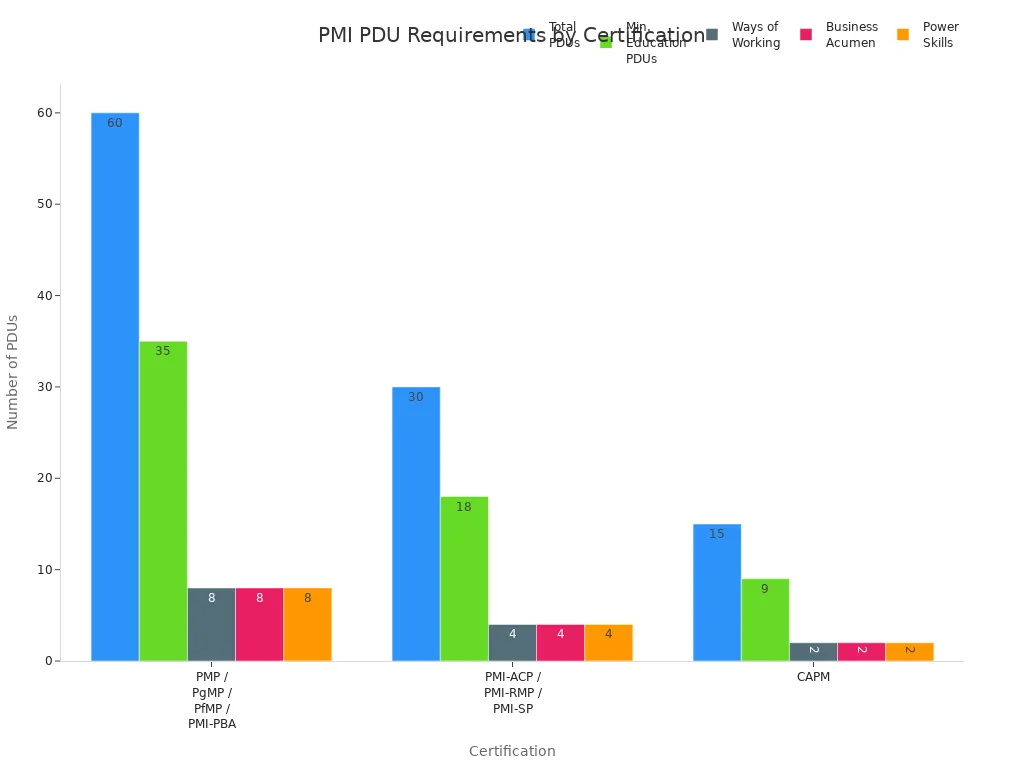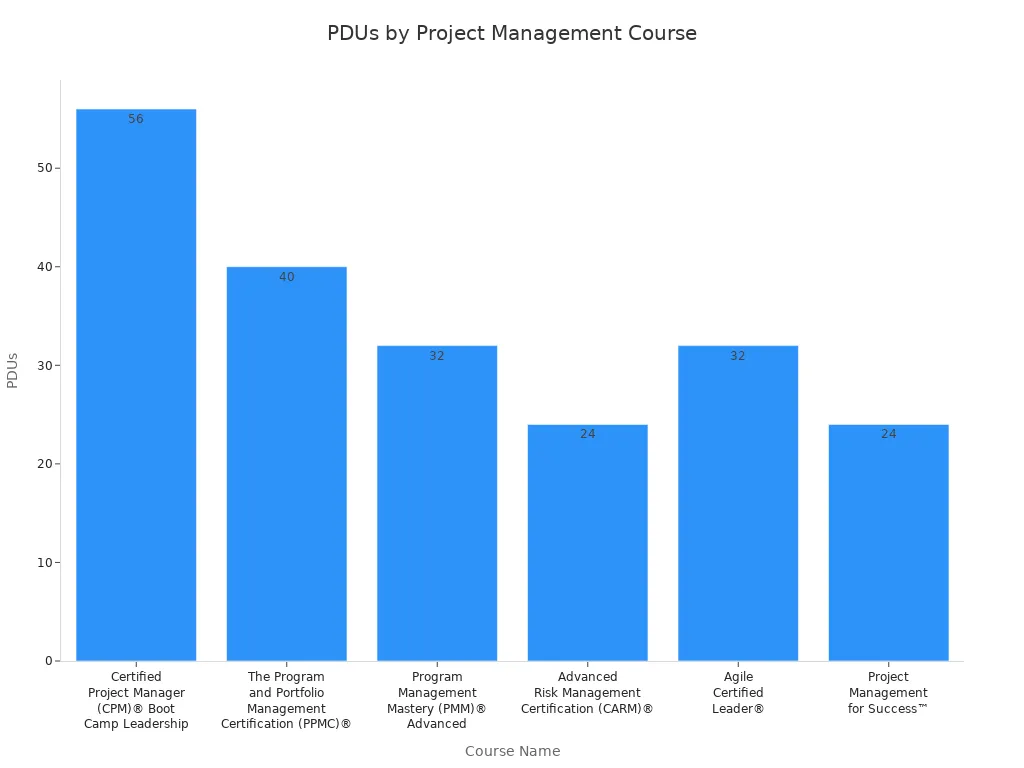
Professional development units (PDU) drive success for project managers. They help individuals maintain PMI certification status and encourage continuous learning. Many professionals rely on Basic PDU options to keep their skills current and confirm their commitment to industry standards. Intelligent PDU strategies allow managers to learn new techniques and track trends.
- PDUs support ongoing professional growth.
- They are required to retain PMI certifications.
- Managers gain new skills and improve competence.
Key Takeaways
- PDUs are essential for maintaining PMI certifications, ensuring project managers stay competitive in their field.
- Earning PDUs demonstrates a commitment to professional growth, which can enhance job prospects and credibility.
- Participating in PDU activities helps project managers learn new methodologies and stay updated on industry trends.
- Networking at PDU events can lead to valuable connections and job opportunities, boosting career advancement.
- Targeted PDU learning can address skill gaps, preparing project managers for new responsibilities and promotions.
- Effective time management strategies can help busy professionals balance work and PDU activities without stress.
- Choosing PDU opportunities that align with career goals maximizes the impact of professional development efforts.
- Regularly tracking and reporting PDUs ensures compliance with PMI requirements and avoids certification issues.
PDU and Certification Maintenance
Keeping Your PMI Credentials Active
The Importance of Logging PDUs
Project managers must keep their PMI certifications active to remain competitive. The Project Management Institute (PMI) requires professionals to earn and report a specific number of PDUs within each renewal cycle. These units reflect ongoing learning and professional engagement. Failing to log PDUs on time can lead to credential suspension or even loss, which may disrupt career progress.
The requirements for maintaining different PMI certifications vary. The table below outlines the renewal cycles and PDU requirements for several popular credentials:
| Certification | Renewal Cycle | Total PDUs | Min. Education PDUs | Ways of Working | Business Acumen | Power Skills | Any Category* |
|---|---|---|---|---|---|---|---|
| PMP / PgMP / PfMP / PMI-PBA | Every 3 Years | 60 | 35 | 8 | 8 | 8 | 11-25 |
| PMI-ACP / PMI-RMP / PMI-SP | Every 3 Years | 30 | 18 | 4 | 4 | 4 | 6-12 |
| CAPM | Every 3 Years | 15 | 9 | 2 | 2 | 2 | 3-6 |

Tip: Setting calendar reminders for PDU deadlines helps professionals avoid last-minute stress and ensures continuous certification.
Real-World Example: Preventing PMP Suspension with Timely PDU Submission
Samantha, a project manager, faced the risk of PMP suspension when she overlooked her PDU reporting deadline. She quickly reviewed her recent training sessions and logged her PDUs through the PMI system. By acting promptly, she maintained her certification and avoided costly re-examination fees. Her experience highlights the importance of tracking and submitting PDUs on time.
Building Professional Credibility
Demonstrating Commitment to Standards
Active PMI credentials signal a strong commitment to industry standards. Employers and clients recognize these certifications as proof of a project manager’s dedication to best practices. The introduction of digital badges by PMI has made it easier for professionals to verify their credentials. This transparency increases trust and demonstrates ongoing professional development.
Holding a PMP certification can significantly enhance a project manager’s credibility. When Rahul led a project for a new international client, his PMP credential immediately established his expertise. The client viewed the certification as a mark of professional excellence, which helped Rahul secure the contract.
Real-World Example: Securing a Client Contract Due to Active Certification
A consulting firm recently competed for a major contract. The client required all project leads to hold active PMI certifications. Because the firm’s project manager had maintained her credentials through regular PDU activities, the firm met the client’s requirements and won the contract. This outcome demonstrates how active certification can directly impact business opportunities.
PDU for Expanding Knowledge and Skills

Staying Ahead with Industry Trends
Learning New Project Management Methodologies
Project managers operate in a fast-changing environment. New methodologies and frameworks appear every year. To stay relevant, professionals must keep learning. PDU activities offer structured opportunities to explore the latest trends in project management. These activities include workshops, webinars, and online courses. They help managers understand new tools and techniques that improve project outcomes.
The following table highlights common industry trends that project managers often learn about through PDU activities:
| Leadership Skills | Strategic & Business Management Skills |
|---|---|
| Brainstorming | Benefits management and realization |
| Coaching and mentoring | Business acumen |
| Conflict management | Business models and structures |
| Emotional intelligence | Competitive analysis |
| Influencing | Customer relationship and satisfaction |
| Interpersonal skills | Industry knowledge and standards |
| Listening | Legal and regulatory compliance |
| Negotiation | Market awareness and conditions |
| Problem solving | Operational functions (finance, marketing) |
| Team building | Strategic planning, analysis, and alignment |
Note: Learning about these trends helps project managers lead teams more effectively and align projects with business goals.
Real-World Example: Implementing Agile After PDU Training
After attending a PDU-approved workshop on Agile methodologies, Maria, a project manager, introduced Agile practices to her team. She noticed improved collaboration and faster delivery times. Her team adapted quickly, and clients expressed higher satisfaction. Maria’s experience shows how learning new methodologies through PDU activities can drive real change in project performance.
Addressing Skill Gaps
Targeted Learning for Career Advancement
Skill gaps can limit a project manager’s growth. PDUs provide a way to target specific areas for improvement. Many professionals use PDU courses to strengthen weak spots or prepare for new responsibilities. This targeted learning supports career advancement and helps managers stay competitive.
- PDUs are essential for maintaining certifications like the PMP®, which require 60 hours of PDUs every three years.
- Project managers with PMP® certification earn, on average, 20% more than their non-certified counterparts, with an average salary of $108,000.
- Organizations with over a third of their project managers PMP®-certified complete projects on time, within scope, and budget more frequently than those without.
Tip: Choosing PDU activities that match career goals can maximize the impact of professional development.
Real-World Example: Mastering Risk Management via PDU Courses
James, an experienced project manager, struggled with risk management. He enrolled in several PDU courses focused on this topic. After completing the training, James applied new risk assessment techniques to his projects. His teams identified potential issues earlier and reduced project delays. This targeted approach helped James earn a promotion and increased his value to the organization.
PDU and Professional Networking

Connecting with Peers and Experts
Attending PDU Events and Workshops
Project managers often find that professional growth extends beyond technical skills. Attending events and workshops designed for earning PDUs creates valuable opportunities to connect with peers and industry experts. These gatherings offer more than just educational content. They provide a platform for sharing experiences, discussing challenges, and exchanging proven strategies.
The table below highlights key features of PDU events that facilitate networking:
| Feature | Description |
|---|---|
| Invaluable Insights | Access to keynote speakers and expert panels sharing actionable insights and proven strategies. |
| Global Networking | Opportunity to connect with thousands of professionals worldwide, fostering lasting relationships. |
Participants gain exposure to diverse perspectives and build relationships that can last throughout their careers. Many project managers report that these connections lead to new collaborations and open doors to future opportunities.
Real-World Example: Finding a Job Through PDU Networking
Networking at PDU events often leads to tangible career benefits. Many professionals have found new job opportunities through contacts made at these gatherings. The following points summarize the impact of PDU-related networking on job prospects:
- PDUs enhance job opportunities for project managers by improving skills and increasing professional credibility.
- Employers recognize the accumulation of PDUs as an investment in one’s career, leading to promotions and salary increases.
- Networking opportunities gained through earning PDUs can significantly expand job prospects.
For example, a project manager attended a regional PMI workshop and connected with a hiring manager from a leading tech firm. This relationship led to an interview and, eventually, a new position. Such stories highlight the power of networking in advancing a project management career.
Accessing Mentorship and Collaboration
Building Relationships with Senior Project Managers
Mentorship plays a crucial role in career development. PDU activities often include mentorship programs or collaborative projects that connect less experienced managers with seasoned professionals. These relationships foster knowledge transfer and help project managers develop critical thinking skills.
A structured mentorship program offers several advantages:
- Mentoring is recognized by the C-Suite as a valuable investment in training, which can enhance career progression.
- Successful project managers often inspire others and apply critical thinking skills, which can be developed through mentoring relationships.
- Both mentors and mentees can record their mentoring activities for PDUs, further incentivizing participation in mentorship programs.
Keegan McCready, a respected project manager, emphasizes the importance of community and networking in professional development. He notes that mentorship helps project managers navigate challenges and develop skills necessary for advancement. During a layoff, he relied on his network for support, demonstrating how mentorship can provide guidance during difficult times.
Real-World Example: Gaining a Mentor at a PMI Chapter Event
At a local PMI chapter event, a project manager met a senior leader who later became her mentor. Through regular meetings, she learned about agile development and joined an internal community focused on innovation. This mentorship not only improved her skills but also positioned her for exciting projects and a promotion. The experience shows how mentorship accessed through PDU activities can directly influence career progression.
PDU for Marketability and Earning Potential
Standing Out in the Job Market
Showcasing Continuous Professional Development
Project managers face a competitive job market. Employers seek candidates who show a commitment to learning and growth. Continuous professional development signals that a project manager stays current with industry standards and best practices. By earning and documenting PDUs, professionals demonstrate their dedication to ongoing improvement. This commitment often sets them apart from other candidates during the hiring process.
The demand for skilled project managers continues to rise. The following table highlights key trends shaping the job market:
| Evidence Type | Description |
|---|---|
| Job Growth | A PMI-commissioned study indicates a projected 33% growth in project management roles by 2027, translating to 22 million additional jobs. |
| Sector Demand | The manufacturing and construction sectors are expected to see nearly 10 million new PM job openings due to attrition. |
| Demographic Shift | An influx of Millennials and Gen Z into project management roles is anticipated, highlighting the need for effective training and PDUs. |
These trends show that project managers who invest in professional development position themselves for new opportunities. Organizations value candidates who can adapt to change and bring fresh skills to the table.
Real-World Example: Getting Shortlisted Thanks to PDU Activities
When a global technology firm posted a senior project manager role, dozens of applicants applied. Among them, Priya stood out because she had recently completed several PDU-approved courses in digital transformation and agile leadership. The hiring team noticed her commitment to learning and placed her on the shortlist. Her proactive approach to professional development gave her a clear advantage over other candidates.
Negotiating Salary and Promotions
Using PDUs as Proof of Value
Project managers who invest in their skills often command higher salaries. PDUs serve as tangible proof of a professional’s value to an organization. During salary negotiations, managers can highlight recent PDU activities to show their expanded expertise and commitment to excellence.
- Negotiation skills are crucial for project managers to secure fair compensation.
- Many project managers miss out on significant earnings by not negotiating their salary.
- PDUs can be earned through activities that enhance negotiation skills, thus adding value to a project manager’s profile.
Employers recognize the importance of project management skills for organizational success. Project managers who negotiate higher salaries reflect the value they bring to their teams.
- Project managers are in high demand, and their skills are vital for organizational success.
- Negotiating a higher salary reflects the value project managers bring to their organizations.
- Accepting a lower salary can have long-term negative consequences on future salary offers.
Real-World Example: Securing a Raise After Completing PDU Training
After completing a series of PDU-approved workshops on leadership and stakeholder management, Marcus approached his manager to discuss a raise. He presented his new skills and recent project successes. His manager recognized the added value and approved a salary increase. Marcus’s experience shows how PDUs can directly support career advancement and higher earnings.
PDU Supporting Long-Term Career Growth
Preparing for Advanced Roles
Transitioning to Program or Portfolio Management
Project managers who aspire to move into advanced roles such as program or portfolio management must demonstrate a higher level of expertise. Earning advanced certifications and completing specialized courses helps them build the skills needed for these positions. Many organizations look for leaders who can oversee multiple projects, manage complex stakeholder relationships, and align project outcomes with business strategy.
The following table highlights popular courses that help project managers earn PDUs while preparing for advanced responsibilities:
| Course Name | PDUs |
|---|---|
| Certified Project Manager (CPM)® Boot Camp Leadership Certification | 56 |
| The Program and Portfolio Management Certification (PPMC)® | 40 |
| Program Management Mastery (PMM)® Advanced Certification | 32 |
| Advanced Risk Management Certification (CARM)® | 24 |
| Agile Certified Leader® | 32 |
| Project Management for Success™ | 24 |
| Organizational Change Management | N/A |
| Project Portfolio Management | N/A |
| Advanced Project Scheduling | N/A |
| Earned Value Management | N/A |
| Project Teams and Teamwork | N/A |

These courses not only provide essential knowledge but also help project managers accumulate the PDUs required for certification renewal. By completing advanced training, professionals gain the confidence and credentials needed to lead larger initiatives.
Real-World Example: Promotion to Senior PM After Earning PDUs
After completing the Program Management Mastery certification, Lisa applied for a senior project manager position. Her new skills in portfolio management and leadership impressed the interview panel. She demonstrated her ability to manage multiple projects and align them with organizational goals. Lisa received the promotion, proving that targeted PDU activities can open doors to advanced roles.
Adapting to Industry Changes
Staying Resilient in a Dynamic Field
The project management landscape continues to evolve rapidly. Digital transformation, new technologies, and shifting business priorities require managers to adapt quickly. PDUs help professionals stay resilient by encouraging continuous learning and skill development. Successful project managers focus on building strong team cultures and fostering psychological safety. They communicate clearly and reassess project alignment regularly to keep pace with change.
Key strategies for adapting to industry changes include:
- Building a strong team culture and ensuring psychological safety.
- Maintaining clear communication from leadership during transitions.
- Structuring operations and reassessing project alignment frequently.
- Communicating early and developing solid project plans for digital initiatives.
- Keeping communication channels open and providing ongoing training.
- Staying informed about industry trends and emerging technologies.
- Encouraging collaboration and monitoring progress closely.
- Integrating technology, culture, and processes for successful transformation.
Project managers who embrace these strategies position themselves as adaptable leaders. They guide teams through uncertainty and drive successful outcomes in dynamic environments.
Real-World Example: Shifting to Digital Projects with New PDU Skills
When her company shifted focus to digital transformation, Maya enrolled in several courses on agile leadership and organizational change. She applied her new knowledge to lead a team through a complex software rollout. By fostering open communication and encouraging collaboration, Maya helped her team adapt quickly. The project succeeded, and her leadership received recognition from senior management.
Overcoming PDU Challenges
Managing Time for PDU Activities
Balancing Work, Life, and Learning
Many project managers struggle to find time for PDU activities. Demanding work schedules, family responsibilities, and personal commitments often compete for attention. Effective time management becomes essential for maintaining certification and professional growth.
Experienced project managers recommend several strategies to balance these demands:
- Use the Eisenhower Matrix to prioritize tasks by urgency and importance.
- Implement time blocking to dedicate specific periods for learning.
- Minimize interruptions by setting boundaries and checking emails at set times.
- Delegate tasks to team members to free up time and empower others.
- Apply the Pomodoro Technique, working in focused intervals with regular breaks.
- Avoid multitasking to maintain concentration and improve results.
- Review and adjust time management methods regularly for continuous improvement.
Tip: Small, consistent efforts—such as dedicating 30 minutes a day to learning—can help professionals accumulate PDUs without overwhelming their schedules.
Real-World Example: Earning PDUs with a Busy Schedule
David, a senior project manager, managed multiple projects while raising two children. He struggled to find time for professional development. By blocking out early mornings for online courses and using the Pomodoro Technique, he completed several PDU activities over six months. David’s approach allowed him to maintain his certification and model effective time management for his team.
Selecting the Right PDU Opportunities
Aligning PDUs with Career Goals
Choosing the right PDU activities can shape a project manager’s career trajectory. Professionals who align their learning with long-term goals gain the most value from their efforts. They often focus on three core components:
| Component | Description |
|---|---|
| Business Acumen | Focuses on strategic goals and how projects align with business objectives. |
| Ways of Working | Emphasizes learning various project management approaches to adapt to project needs. |
| Power Skills | Involves interpersonal skills necessary for effective leadership and team influence. |
Project managers should evaluate each PDU opportunity based on its relevance to their desired roles. For example, those seeking leadership positions may prioritize courses that build power skills, while others may focus on business acumen or new methodologies.
The value of different PDU activities also depends on their category:
| PDU Category | Description | Maximum PDUs |
|---|---|---|
| Education | Activities that increase project management knowledge through training, courses, or meetings. | Unlimited |
| Giving Back | Activities that contribute to project management knowledge, such as volunteering or creating content. | 25 (with a maximum of 8 from Work as Practitioner) |
Note: Selecting a mix of education and giving back activities can help professionals meet requirements and develop a well-rounded skill set.
Real-World Example: Choosing PDUs for a Desired Promotion
Sofia wanted to move into a program management role. She reviewed her career goals and selected PDU courses in business strategy and stakeholder engagement. By focusing on relevant skills, she demonstrated readiness for advanced responsibilities. Her targeted approach led to a successful promotion within her organization.
Getting Started with PDU Earning
Easy Ways to Begin
Free and Low-Cost PDU Options
Project managers often seek accessible ways to begin earning PDUs. Many options require little or no financial investment. PMI members can attend local chapter events, which are frequently free. PMI offers over 1,000 webinars at no cost, providing a convenient way to earn Education PDUs. Professionals can contribute to wikis or discussion boards, sharing insights and gaining PDUs for their participation. Creating podcasts or webinars allows managers to showcase expertise and earn credit. Writing articles or blog posts that introduce new knowledge also qualifies for PDUs.
New project managers can start with these simple activities:
- Attend PMI events, especially those offered free to members.
- Participate in PMI publishing quizzes, earning 1–2 PDUs per quiz.
- Join committees or volunteer at local PMI chapters.
- Leverage current job responsibilities by claiming up to 5 PDUs annually for working at least 1,500 hours in project management.
- Follow local PMI branches on social media to discover free events and workshops.
- Take part in professional development courses, such as workshops or PMI-approved webinars.
Tip: Combining several free and low-cost activities helps professionals accumulate PDUs quickly and efficiently.
Real-World Example: Volunteering to Earn PDUs
Jessica, a project manager, wanted to maintain her certification without increasing expenses. She volunteered at her local PMI chapter, helping organize monthly meetings. Through her involvement, she earned multiple PDUs and expanded her professional network. Her volunteer work provided valuable experience and contributed to her ongoing professional development.
Tracking and Reporting PDUs
Using PMI’s CCRS System
Accurate tracking and reporting of PDUs ensures compliance with PMI requirements. The Continuing Certification Requirements System (CCRS) streamlines this process. The CCRS dashboard allows users to monitor their PDU progress, check certification status, and submit claims efficiently. The system guides users through each step, minimizing errors and simplifying documentation.
Project managers follow these steps to report PDUs:
- Log in to the online CCRS.
- Select “Report PDUs” on the left side of the page.
- Click the appropriate PDU category.
- Fill in the required information. For PDUs from an Authorized Training Partner, select their details from the dropdown menu. Otherwise, enter information manually.
- Agree to the accuracy of the PDU claim by checking the box.
- Submit the claim and review the CCRS dashboard for pending and approved PDUs.
Note: Regularly updating the CCRS dashboard helps professionals avoid missing deadlines and ensures all activities are properly documented.
Real-World Example: Avoiding Audit Issues with Proper Documentation
Michael, a senior project manager, faced a random PMI audit. He had consistently logged his PDUs in the CCRS system and kept supporting documentation for each activity. When PMI requested verification, he provided records quickly. His organized approach allowed him to pass the audit without delays, demonstrating the importance of accurate tracking and reporting.
PDUs serve as a strategic asset for project managers. They help maintain certifications, document ongoing development, and demonstrate a commitment to growth. Consistently earning PDUs sharpens skills, prepares individuals for future opportunities, and keeps them ahead of industry trends. Project managers who engage in meaningful learning, participate in workplace projects, and share knowledge with the community unlock new career opportunities and boost their credibility. Prioritizing PDU activities leads to lasting professional success and positions individuals for leadership in project management.
FAQ
What are PDUs in project management?
PDUs, or Professional Development Units, measure ongoing education and professional activities for project managers. PMI requires PDUs to maintain certifications. Each PDU represents one hour of learning or contribution.
How can a project manager earn PDUs?
Project managers earn PDUs through education, volunteering, attending events, or creating content. PMI offers webinars, courses, and chapter meetings. Many organizations also provide internal training that qualifies for PDUs.
Tip: PMI’s website lists approved PDU activities and providers.
How many PDUs are needed to renew a PMP certification?
A PMP certification requires 60 PDUs every three years. These must include education in Ways of Working, Power Skills, and Business Acumen. The remaining PDUs can come from volunteering or other professional contributions.
Can PDUs be earned for work experience?
Yes. PMI allows project managers to claim up to 8 PDUs per cycle for working as a practitioner. The work must involve project management responsibilities and align with PMI’s Talent Triangle.
What happens if a manager does not submit enough PDUs?
PMI suspends the certification if a manager does not submit enough PDUs before the renewal deadline. The manager may lose their credential and must reapply or retake the exam to regain certification.
Are free PDU options available?
Many free PDU options exist. PMI offers complimentary webinars, chapter events, and online quizzes. Volunteering and contributing to professional communities also provide PDUs at no cost.
| Free PDU Source | Example Activity |
|---|---|
| PMI Webinars | Online learning sessions |
| Chapter Events | Local meetings |
| Volunteering | Organizing events |
How should PDUs be tracked and reported?
Project managers use PMI’s Continuing Certification Requirements System (CCRS) to track and report PDUs. The system provides a dashboard for monitoring progress and submitting claims. Accurate records help avoid audit issues.
Note: Always keep supporting documentation for each PDU activity.
Post time: Sep-01-2025

